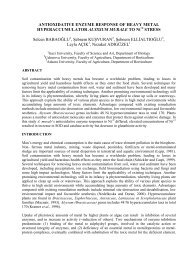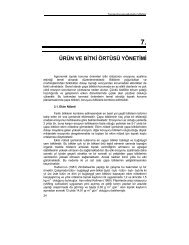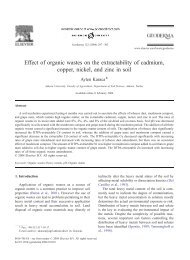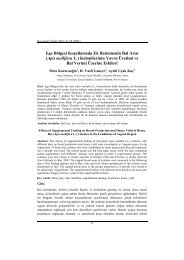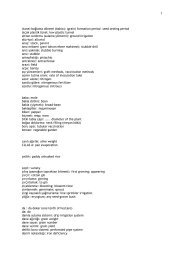Principles of Plant Genetics and Breeding
Principles of Plant Genetics and Breeding
Principles of Plant Genetics and Breeding
Create successful ePaper yourself
Turn your PDF publications into a flip-book with our unique Google optimized e-Paper software.
there is no inherent health risk in the use <strong>of</strong> biotechnology<br />
to develop new food products. The food industry<br />
opposes m<strong>and</strong>atory labeling because <strong>of</strong> the concern that<br />
such labeling could be interpreted as being “warning<br />
labels” implying that biotech foods are less safe or nutritious<br />
than their conventional counterparts.<br />
The FDA requires a food product (including biotechnology<br />
foods) to be labeled if the following apply:<br />
1 It contains a protein known to pose allergenic risk<br />
(e.g., milk, eggs, peanuts, tree nuts). Consequently,<br />
any genetic engineering involving gene transfer from<br />
any <strong>of</strong> these organisms must be labeled.<br />
2 Its nutrient content as a result <strong>of</strong> the genetic manipulation<br />
is significantly different from what occurs in a<br />
normal product. For example, if a high level <strong>of</strong> protein<br />
is engineered into a cereal or root crop, the product<br />
must be labeled.<br />
Opponents argue that labeling all biotechnologically<br />
produced foods would increase the cost <strong>of</strong> products as<br />
a result <strong>of</strong> the added cost <strong>of</strong> product segregation for<br />
the purpose <strong>of</strong> the so-called identity preservation <strong>of</strong><br />
GM <strong>and</strong> non-GM products. To avoid contamination,<br />
biotech <strong>and</strong> conventional products must be kept apart<br />
at all phases <strong>of</strong> production, storage, processing, <strong>and</strong> distribution<br />
at additional cost. This would impact bulk or<br />
commodity products like grains (corn, wheat, soybean).<br />
However, specialty <strong>and</strong> high value fruits <strong>and</strong> vegetables<br />
are already identity preserved for premium prices.<br />
Labeling <strong>of</strong> all products might be helpful to those<br />
who practice certain lifestyles or religious beliefs that<br />
impose strict dietary observances. A plant with an animal<br />
gene may not be acceptable to a strict vegetarian.<br />
However, studies have shown that both the kosher<br />
(Jewish) <strong>and</strong> halal (Muslim) communities have mechanisms<br />
in place to determine which products are acceptable<br />
to their adherents. Leaders <strong>of</strong> both religious groups<br />
have ruled that simple gene additions that lead to one or<br />
a few new components in a species are acceptable for<br />
their religious practices. However, the Muslim community<br />
has not resolved the issue regarding acceptability <strong>of</strong><br />
gene transfer from swine into species, should that happen.<br />
Both Jewish <strong>and</strong> Muslim communities accept the<br />
use <strong>of</strong> bioengineered chymosin (rennin) in the cheese<br />
production.<br />
Many countries have some form <strong>of</strong> labeling regulations<br />
or guidelines, which can be m<strong>and</strong>atory or voluntary.<br />
The primary forum for the discussion <strong>of</strong> food<br />
labeling at the international level is the Codex<br />
Alimentarius Commission. M<strong>and</strong>atory labeling has been<br />
ISSUES IN THE APPLICATION OF BIOTECHNOLOGY IN PLANT BREEDING 275<br />
implemented in the EU <strong>and</strong> is being implemented in<br />
Japan. In Europe, all products containing GM organisms<br />
must be labeled as such. Even where mixtures <strong>of</strong><br />
conventional <strong>and</strong> GM organisms are concerned, a label<br />
must be provided to indicate that GM organisms may be<br />
present. The USA <strong>and</strong> Canada require GM food products<br />
that could have health or safety effects (possible<br />
allergens or changes in nutritional content from acceptable<br />
levels) to be labeled.<br />
In North America, labeling is generally thought to be<br />
necessary only when there is some feature <strong>of</strong> the product<br />
itself that needs to be brought to consumers’ attention<br />
(e.g., health risk or nutritional issue). The process by<br />
which the product is produced (e.g., by genetic<br />
modification) is considered inconsequential. This is<br />
described as product-based (as opposed to processbased)<br />
regulation. An exception to this approach in the<br />
USA <strong>and</strong> Canada is the requirement that food subjected<br />
to the processes <strong>of</strong> irradiation be labeled. In the USA,<br />
the FDA <strong>and</strong> the courts generally consider reference<br />
should be made to a “material fact” about the product<br />
that is pertinent to nutritional value or safety. This<br />
affirms the concept <strong>of</strong> substantial equivalence in which a<br />
new food product that is substantially equivalent to<br />
existing products is exempt from labeling.<br />
Economic impact <strong>of</strong> labeling<br />
<strong>and</strong> regulations<br />
The economic impact <strong>of</strong> food regulations <strong>and</strong> labeling<br />
on trade depends on the products involved, the cost<br />
<strong>of</strong> labeling, <strong>and</strong> sometimes how consumers use such<br />
information. The cost <strong>of</strong> labeling will depend on the<br />
stringency imposed. That is, whether “zero tolerance”<br />
or “minimum tolerance” <strong>of</strong> GM product is the goal.<br />
Implementing the former st<strong>and</strong>ard would require<br />
expensive safeguards to be implemented to avoid crosscontamination.<br />
Harvesting, processing, shipping, <strong>and</strong><br />
other product h<strong>and</strong>ling would require modification.<br />
Government approval can have severe adverse consequences<br />
on trade. For example, sale <strong>of</strong> US corn in EU<br />
countries was dealt a devastating blow in 1999 because<br />
certain GM corn varieties were not approved for sale in<br />
the EU. This action caused US corn export to the EU<br />
to drop from US$190 million in 1997 to $35 million<br />
in 1998, <strong>and</strong> then to a low <strong>of</strong> $6 million in 1999.<br />
Consumer response to labeling has an impact on product<br />
dem<strong>and</strong>. Sometimes, products intended for use as<br />
feed may not require labeling.




